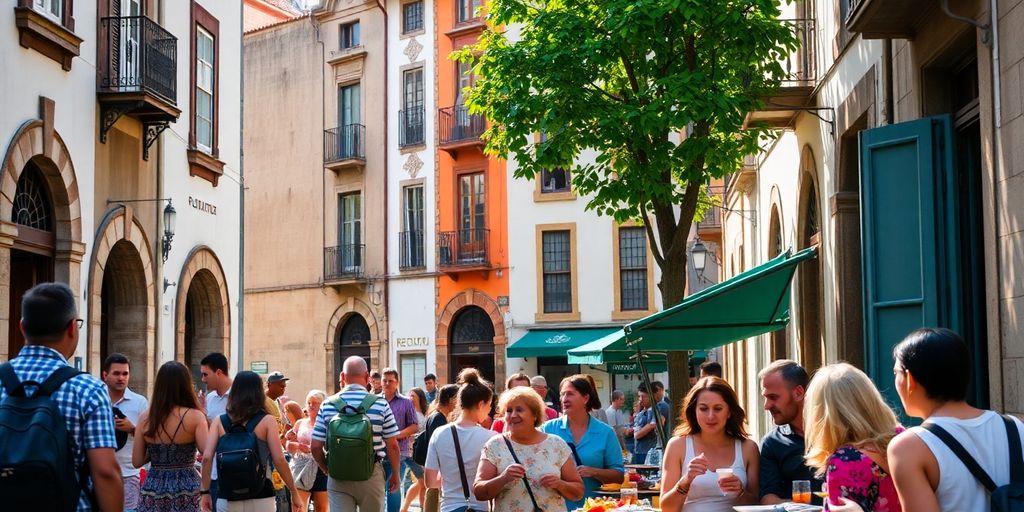
Exploring Cultural Integration
Moving to a new country can be both exciting and overwhelming. For foreigners in Portugal, cultural integration is a journey that involves learning about local customs, social norms, and everyday life. This article explores the various aspects of Portuguese culture and how newcomers can adapt and thrive in their new environment.
Key Takeaways
- Understanding local customs helps in building relationships.
- Respecting social etiquette is crucial for smooth interactions.
- Family plays a central role in Portuguese society.
- Workplace culture emphasizes personal connections and communication.
- Participating in community events fosters friendships and integration.
Understanding Portuguese Culture and Society

When you’re thinking about moving to Portugal, it’s a good idea to get a feel for the local culture. It’s not just about seeing the sights; it’s about understanding how people live and interact. This can really help you settle in and feel more at home. Let’s take a look at some key aspects.
Influence of Religion
Religion, specifically Catholicism, has a big impact on Portuguese culture. While Portugal doesn’t have an official religion, a large portion of the population identifies as Christian. This influence shows up in many traditions and celebrations throughout the year. You’ll see it in the local festivals, the way families gather, and even in some of the social values. Keep an eye out for the religious holidays; they’re often a big deal and a great way to experience the culture firsthand. Understanding this influence can help you better appreciate the local customs and religious diversity.
Social Norms and Values
Portuguese society values politeness and respect. Modesty is appreciated, and people tend to be quite formal in their interactions, especially when meeting someone for the first time. You’ll notice this in the way people address each other, often using titles like Senhor or Senhora unless invited to use first names. Here are some things to keep in mind:
- Punctuality: While not as strict as in some other cultures, being on time is generally appreciated, especially in the North.
- Greetings: Handshakes are common, but close friends might greet each other with a kiss on both cheeks.
- Communication: Direct eye contact is important, but avoid staring, which can be seen as rude.
Regional Differences
Portugal isn’t a huge country, but there are definitely regional differences to be aware of. The North tends to be more traditional and conservative, while the South is often more relaxed. Even the language can change a bit from region to region, with different dialects and accents. For example, people from the North are often considered more punctual than those from the South. And when it comes to food, each region has its own specialties. Exploring these differences can add a lot to your experience of living in Portugal.
Navigating Social Etiquette
Meeting and Greeting
When you’re meeting someone in Portugal, the way you greet them really depends on the situation. A handshake is the most common greeting, especially if you don’t know the person well. It’s usually accompanied by a simple olá (hello) or bom dia (good day). For women, it’s polite for a man to wait for her to extend her hand first. If you’re meeting friends or family, expect cheek kisses – usually two, starting with the right cheek. Men often hug and pat each other on the back. Also, remember that in group settings, it’s customary to greet everyone individually when you arrive and say goodbye when you leave. It’s a sign of respect.
Dining Etiquette
Dining in Portugal can be a relaxed and enjoyable experience, but there are a few things to keep in mind. Family-style dining is pretty common, where dishes are placed in the center of the table for everyone to share. The host usually serves themselves first, and then the dishes are passed to the left. Once everyone has been served, the host will often say bom apetite or bom proveito before anyone starts eating. Don’t be surprised if meals take longer than you’re used to; a traditional family lunch can sometimes last for hours, especially on Sundays. Table manners are generally similar to those in other European countries, but it’s always a good idea to observe what others are doing and follow their lead.
Conversation and Communication
When you’re chatting with people in Portugal, there are a few things to keep in mind to ensure smooth communication. Portuguese people generally value politeness and respect, so it’s a good idea to be mindful of your tone and language. In more formal situations, it’s appropriate to address people as Senhor (Mr.) or Senhora (Ms.), followed by their last name. Direct eye contact is generally appreciated, as it shows that you’re engaged in the conversation. However, avoid staring, as that can be seen as rude. Also, be aware that Portuguese people can sometimes be quite expressive, using gestures and animated speech. Don’t be afraid to ask for clarification if you don’t understand something; most people will be happy to help. Learning a few basic Portuguese phrases can go a long way in making a good impression and showing that you’re making an effort to connect with the local culture.
Exploring Family Dynamics
The Family Unit
Family plays a big role in Portuguese culture. It’s not just about parents and kids; it often includes grandparents, aunts, uncles, and cousins. Family gatherings are common, especially on weekends and holidays. You’ll find that decisions, big or small, are often made with the family’s input. Expect to be included in family events if you become close to a Portuguese person. It’s a sign of acceptance and warmth.
Marriage and Relationships
While things are changing, traditional values still hold some sway in relationships. Marriage is still seen as important by many, and family approval can mean a lot. However, younger generations are embracing more modern views on dating and partnerships. You might notice a mix of old and new when it comes to relationships. For example, dating might be more casual at first, but as things get serious, family involvement tends to increase. It’s a good idea to be aware of this dynamic as you navigate relationships in Portugal.
Generational Living
It’s pretty common for multiple generations to live under one roof. This isn’t always out of necessity; it’s often a cultural preference. Grandparents often help with childcare, and younger family members provide support for the older generation. This living arrangement can create strong family bonds, but it can also present challenges. You might find that decisions about the household are made collectively, and respecting the opinions of older family members is important. If you’re living with a Portuguese family, understanding this dynamic can help you integrate more smoothly.
Adapting to the Workplace
So, you’re about to start working in Portugal? That’s awesome! But it’s not just about showing up and doing your job. Understanding the local workplace culture is super important for a smooth transition. It’s more than just knowing the language; it’s about understanding the unspoken rules and expectations.
Business Culture
Portuguese business culture can be a bit more formal than what you might be used to. Building relationships is key. Decisions often take time because they value discussion and consensus. Don’t be surprised if things move slower than you expect. It’s also a good idea to have your important documents translated into Portuguese, even if everyone speaks English. It shows respect and attention to detail.
Communication Styles
Communication in Portugal can be indirect. People might not always say exactly what they mean, so pay attention to non-verbal cues. They value politeness, so avoid being overly direct or confrontational. Small talk is important before getting down to business. It’s a way to build rapport and establish a connection. Also, physical space matters; they tend to stand less than a foot away from each other during conversations.
Work-Life Balance
Work-life balance is valued in Portugal, though it can vary depending on the industry and company. Lunch breaks are often longer, allowing time to relax and socialize. While there’s a growing awareness of the importance of personal time, expectations can still lean towards longer hours in some sectors. It’s a good idea to clarify expectations with your employer upfront. Here are some things to keep in mind:
- Understand the local labor laws regarding working hours and vacation time.
- Be aware of the cultural norms around taking breaks and leaving on time.
- Don’t be afraid to set boundaries to protect your personal time.
Engaging in Community Life

Getting involved in your local community is a fantastic way to feel more at home in Portugal. It’s about more than just living in a place; it’s about becoming a part of it. You’ll meet people, learn new things, and maybe even discover a hidden talent or two. Plus, it’s a great way to improve your Portuguese!
Local Events and Festivals
Portugal is a country that loves to celebrate! From religious festivals to food fairs, there’s always something going on. Check out local listings or ask around to find out what’s happening in your area. Attending these events is a great way to experience Portuguese culture firsthand. Don’t be afraid to jump in and participate – the locals are usually very welcoming. You might find a favourite new tradition or dish!
Volunteer Opportunities
If you’re looking to give back to your community, volunteering is a great option. There are many organizations in Portugal that need help, from animal shelters to environmental groups. Volunteering in Portugal not only benefits the cause you’re supporting, but it also allows you to meet like-minded people and practice your Portuguese in a real-world setting. It’s a win-win!
Building Friendships
Making friends in a new country can be challenging, but it’s definitely possible. Here are a few tips:
- Join a club or group that interests you. This could be anything from a hiking club to a book club.
- Attend local events and strike up conversations with people.
- Take a language class. This is a great way to meet other expats and locals who are interested in learning languages.
Remember that building friendships takes time, so be patient and persistent. Don’t be afraid to put yourself out there and initiate conversations. You might be surprised at how welcoming the Portuguese people are. And who knows, you might just make some lifelong friends!
Experiencing Regional Variations
Portugal isn’t just one big cultural blob; it’s more like a patchwork quilt, with each region offering its own unique flavor. As you explore, you’ll quickly notice that what’s considered normal in Lisbon might raise an eyebrow in the Algarve. It’s all part of the charm, really. Understanding these differences can really enrich your experience and help you connect with locals on a deeper level. Let’s explore the Algarve and other regions.
Cultural Differences Across Regions
Okay, so where do you even start? Well, think of it this way: Northern Portugal tends to be more traditional and reserved, while the South is generally more laid-back and tourist-oriented. In the big cities, like Lisbon and Porto, you’ll find a more cosmopolitan vibe, influenced by international trends. But head inland, and you’ll discover villages where life moves at a slower pace, and traditions are fiercely guarded. These aren’t just stereotypes, but general tendencies that can shape your interactions and expectations. For example, the way people greet each other can vary – a kiss on both cheeks might be standard in one place, while a simple handshake is preferred in another.
Cuisine and Traditions
Food is a HUGE deal in Portugal, and each region boasts its own specialties. Up north, you’ll find hearty dishes like Francesinha (a massive sandwich covered in sauce) and Tripas à Moda do Porto (tripe stew – an acquired taste, for sure!). Down south, seafood reigns supreme, with grilled sardines and cataplana (a seafood stew cooked in a copper pot) being popular choices. And don’t even get me started on the sweets! Each region has its own unique pastries and desserts that are worth trying. Participating in local food festivals is a great way to immerse yourself in the regional culture and try new things.
Language Dialects
While Portuguese is the official language, you’ll quickly realize that not all Portuguese sounds the same. Just like in the US, there are regional dialects and accents that can be quite distinct. Someone from the Azores might sound very different from someone from Lisbon. While everyone will understand standard Portuguese, being aware of these variations can help you better understand and appreciate the local nuances. Plus, attempting to learn a few local phrases can go a long way in showing respect and building rapport with the community. It’s all about understanding local culture and embracing the differences.
Overcoming Challenges of Integration

Moving to a new country is exciting, but let’s be real, it’s not always easy. Portugal is a welcoming place, but you’ll probably hit a few bumps as you settle in. It’s all part of the process, and knowing what to expect can make things a lot smoother.
Language Barriers
Okay, so Portuguese isn’t the easiest language to pick up. Even if you’ve studied a bit, real-world conversations can be tough. Don’t be afraid to make mistakes – it’s how you learn!
- Take a language class. Seriously, even a basic course helps.
- Use language learning apps. They’re great for vocab and grammar.
- Watch Portuguese TV and movies. It’s fun and you pick up slang.
Consider joining a language exchange program to practice with native speakers. It’s a win-win!
Cultural Misunderstandings
Things that are normal in your home country might be weird in Portugal, and vice versa. It’s all about understanding the cultural nuances. For example, the Portuguese can sometimes come across as reserved, but it’s just their way.
- Do some research on Portuguese customs before you go.
- Pay attention to how locals interact with each other.
- Ask questions if you’re unsure about something.
Finding Support Networks
Feeling homesick or lost? It happens! You need people to lean on. Luckily, there are tons of ways to connect with other expats and locals.
- Join expat groups on social media. They’re a great source of info and support.
- Attend local events and meetups. Get out there and mingle!
- Volunteer for a cause you care about. It’s a great way to meet like-minded people.
Don’t underestimate the power of building friendships with locals. They can help you understand the culture and feel more at home.
Final Thoughts on Cultural Integration in Portugal
In conclusion, moving to Portugal can be a rewarding experience for foreigners. The blend of rich traditions and modern influences creates a unique environment. While there are challenges, like adapting to local customs and social norms, many find that the welcoming nature of the Portuguese people makes the transition smoother. Building connections with locals can take time, but it often leads to meaningful relationships. Overall, embracing the culture and being open to new experiences can greatly enhance your time in Portugal.
Frequently Asked Questions
What is the main religion in Portugal?
The main religion in Portugal is Catholicism, with about 90% of people identifying as Christians.
How do people greet each other in Portugal?
In Portugal, people usually greet each other with a handshake or a kiss on the cheek, depending on how well they know each other.
What is family life like in Portugal?
Families in Portugal are often small, with one or two children. It’s common for several generations to live together or close by.
What is the work culture like in Portugal?
The work culture in Portugal values personal relationships and discussions. Meetings may take time, and it’s polite to use Portuguese in business communications.
Are there any special events or festivals in Portugal?
Yes, Portugal has many local events and festivals throughout the year, celebrating everything from food to music and culture.
What challenges do foreigners face when integrating into Portuguese society?
Foreigners often face challenges like language barriers, cultural misunderstandings, and finding support networks to help them settle in.



